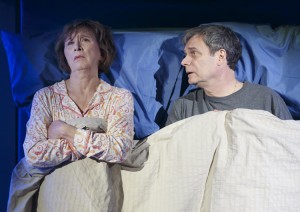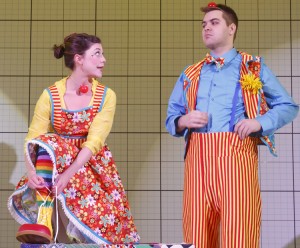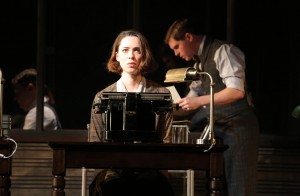The title of Brian Richard Mori’s new play, Hellman v. McCarthy, will ring bells for anyone with memories of the early 1980s. It is the case of libel brought by playwright Lillian Hellman (The Little Foxes, The Children’s Hour) against novelist Mary McCarthy (The Group) after the latter, in an appearance on The Dick Cavett Show taped on Oct. 23, 1979, called Hellman “dishonest.” Pressed by Cavett as to why, McCarthy said, “Every word she writes is a lie, including ‘and’ and ‘the.’” Hellman, sick, arthritic and chronically irascible, saw the broadcast and called her lawyer.
The prolonged suit for libel over the next several years was one of the most notorious literary feuds of the 20th century and drew in scores of intellectuals. Those whom Mori mentions in passing include Norman Mailer, a friend of Hellman until he urged her to drop her case; Philip Rahv, founder of Partisan Review and McCarthy’s ex-lover; and Stephen Spender, the British poet who spent time in Berlin in the 1920s with Christopher Isherwood and W.H. Auden and invited the women to a cocktail party in 1948—where, in their first meeting, McCarthy challenged Hellman in front of student admirers about her glib defamation of novelist John Dos Passos in the Spanish Civil War.
Hellman v. McCarthy sticks to the timeline of the lawsuit, although Mori occasionally touches on longstanding political friction as a source of the women’s mutual loathing: in the 1930s Hellman was a Stalinist; McCarthy, a Trotskyite. Hellman was famous for telling the House Un-American Activities Committee: “I cannot and will not cut my conscience to fit this year’s fashions.” But she was also an apologist for Stalin long after the dictator’s purges of the 1930s had revolted most left-wingers.
Mori’s script is up to the juicy story, encompassing re-enaction, legal documents, and speculation, but director Jan Buttram has added an extraordinary coup of stunt casting. Dick Cavett himself re-enacts his interview with McCarthy, his own deposition in the case (he was a co-defendant, with PBS), and a run-in with Hellman at a cocktail party. He also serves occasionally as narrator, and his wry, self-deprecating humor helps blunt Hellman’s toxic presence. (Cavett has also apparently made minor alterations to his dialogue. When explaining why he prefers policemen to lawyers, the practiced comic provides a better-phrased punch line than in Mori’s script.)
As Hellman, Roberta Maxwell displays the charisma of a basilisk (Hellman's appearance in an ad for Blackglama mink coats didn’t need to mention her name; the tagline read “What Becomes a Legend Most?”). More important, Maxwell conveys Hellman’s arrogance and casual lying, the self-loathing she felt as a Jew, and the bogus sincerity she affected when it suited her. “Such a shame it was cancelled,” she purrs to Cavett about his ABC interview show—but she flashes a crocodile smile. Maxwell doesn’t neglect the physical either: one sees Hellman’s fingers gnarled from crippling arthritis.
Marcia Rodd as McCarthy finds both smugness and wit in the less financially secure author, and a bit of humor in her loquacious deposition. She’s attractive and elegant, as the real McCarthy was, and she displays McCarthy's confidence in herself, gained from being orphaned at an early age and surviving a brutal marriage to critic Edmund Wilson.
Jeff Woodman and Peter Brouwer play the women’s lawyers, providing contrast with their brisk, businesslike demeanors. Mori has added the character of a gay nurse for Hellman, Ryan (Rowan Michael Meyer), who endures her abuse but remains loyal to her, and their interplay includes a lovely scene that gives Maxwell a chance to show a brief flash of humanity. Mori also takes a leaf from Friedrich Schiller’s Mary Stuart: near the end McCarthy and Hellman meet so that McCarthy can offer a personal apology, though no such meeting ever took place.
To defend herself in the suit, McCarthy questioned everything Hellman ever wrote, exposing the falseness of the episode in Pentimento that became the film Julia. Hellman’s reputation was torpedoed, but her detestable personality guaranteed that sympathy for her was in short supply. As Cavett recalls, the night she died in 1984 he was working at the Williamstown Theatre Festival in the Berkshires. He heard a stagehand on the phone. “What? Lillian? She’s dead? Tell them to be sure to drive the stake through!”
Hellman v. McCarthy plays at the Abingdon Theatre Company, 312 W. 36th St., to April 13, with evening performances at 7 p.m. Tuesday through Thursday and at 8 p.m. Friday and Saturday. Matinees are 2 p.m. on Saturdays and Sundays. Tickets are $40.






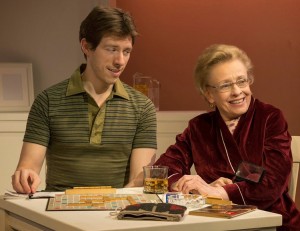



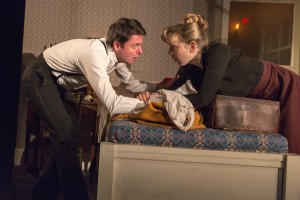



![London Wall 0404[1]](http://static1.squarespace.com/static/585832425016e17cbf7235be/587536246fd27cad3e63291a/58753b506fd27cad3e63af2b/1484077904518/London-Wall-04041.jpg?format=original)
![London Wall 218[1]](http://static1.squarespace.com/static/585832425016e17cbf7235be/587536246fd27cad3e63291a/58753b516fd27cad3e63af2e/1484077905455/London-Wall-2181.jpg?format=original)
![London Wall 025[1]](http://static1.squarespace.com/static/585832425016e17cbf7235be/587536246fd27cad3e63291a/58753b536fd27cad3e63af35/1484077907019/London-Wall-02511-300x199.jpg?format=original)











